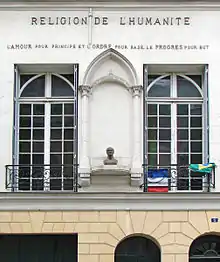Clotilde de Vaux
Clotilde de Vaux, born Clotilde Marie (April 3, 1815 in Paris – April 5, 1846 in Paris), was a French intellectual known to have inspired the French philosopher Auguste Comte's Religion of Humanity.
Clotilde de Vaux | |
|---|---|
.jpg.webp) | |
| Born | April 3, 1815 Paris, France |
| Died | April 5, 1846 (aged 31) Paris, France |
| Education | Maison d'éducation de la Légion d'honneur |
| Occupation(s) | Poetry, writing |
| Parent(s) | Simon Marie (father) and Henriette de Ficquelmont (mother) |
Biography
Charlotte Clotilde Josephine Marie was born in Paris on April 3, 1815. She was the daughter of Simon Marie (1775-1855) an infantry captain in Napoleon's Grande Armée from a modest background, and Henriette Josephine de Ficquelmont (1780-1843), poor, but from the nobility of Lorraine.[1]
The financial situation of her father, retired Captain Marie, was dire for a household with a wife and three children: Clotilde (born in 1815), Maximilian (born in 1819) and Leon (born in 1820) therefore, her father was given the office of tax collector in Méru near Paris to help him.[2]
Clotilde spent her childhood in Méru with her two younger brothers Maximilien and Leon.[2]
Clotilde de Vaux was educated at the Maison d'éducation de la Légion d'honneur. In 1835 she had a marriage of convenience with an Amédée de Vaux, who helped her father at his office of tax collector in Méru, but her husband turned out to be nothing but a rogue. After incurring enormous gambling debts, he eventually left his wife and fled to Belgium.
According to the Code Civil of the time, women were unable to remarry without previously being divorced and, since no divorce had been issued, Clotilde was forbidden to do so. Consequently, she returned to Paris, first living with her parents before moving to her own place in Marais' rue Payenne. One of her uncles Karl Ludwig von Ficquelmont, Minister-president of the Austrian Empire, granted her a housing allowance. Clotilde decided to begin a writer's career and wrote short stories for literary magazines.
In October 1844, when visiting her brother, Clotilde met one of his Polytechnique's Professors, philosopher Auguste Comte. The first known letter from Comte to Clotilde is dated April 30, 1845 and from that day on it was very clear that he was in love with her, a love which Clotilde, a fervent Catholic, firmly rejected. Nonetheless she agreed to follow up with their correspondence and Comte's passionate love kept growing until Clotilde suddenly died of tuberculosis a year later.
Comte, recognizing her as his muse, was highly impressed by her high morals which gave him the key to understand the religious dimension of the human condition. But if Clotilde was a fervent Catholic, Comte only considered Catholicism to be a step[3] towards the positive stage. Nonetheless, Clotilde's faith persuaded him to create a religion for positivist societies in order to fulfill the cohesive function once held by traditional worship.
Birth of the Religion of Humanity


.jpg.webp)
In mourning after Clotilde's death, Comte dedicated himself to reorganise his previous philosophical system into a new positivist secular religion: the Positivist Church or Religion of Humanity.
Comte's secular religion is no vague effusion of humanistic piety, but a complete system of belief and ritual, with a calendar reform called the 'positivist calendar' (with Sainte Clotilde's day each April 6 and a Day of Holy Women), liturgy and sacraments, priesthood and pontiff, all organized around the public veneration of Humanity, the Nouveau Grand-Être Suprême (New Supreme Great Being) made after Clotilde de Vaux.
- In Système de politique positive (1851–1854), Auguste Comte expressed his idea of a " religion of Humanity ", whose pillars are:
- altruism, leading to generosity and selfless dedication to others.
- order : Comte thought that after the French Revolution, society needed restoration of order.
- progress : the consequences of industrial and technical breakthroughs for human societies.
- In Catéchisme positiviste (1851), Comte defined the Church of Humanity's sacraments :
- the Introduction (nomination and sponsoring)
- the Admission (end of education)
- the Destination (choice of a career)
- the Marriage,
- the Retirement (age 63),
- the Séparation, social extreme unction,
- the Incorporation, 3 years after death.
Comte's "Religion of Humanity" was rather unsuccessful in France but has been very influential in Latin America, especially in Brazil (see above) and has inspired the rise of the "Church of Humanity" in England and its variant in New York City, both being extremely small today.
Clotilde de Vaux's writings
- Pensées d'une fleur, poems
- Lucie, series of short stories published in Le National
- Willelmine, short story
- Citations :
- " There is no higher pleasure than the one of dedication. »
- " Mankind, more than other species, needs to tie down to duties to ensure true feelings. »
- (On Society) " Its institutions deserve respect as the toil of times... »
- " It's unworthy of noble hearts to spread the confusion they feel. »
References
- Maurice Wolff, Le roman de Clotilde de Vaux et de Auguste Comte, Perrin, 1929, page 4.
- Charles de Rouvre, L'amoureuse histoire d'Auguste comte et de Clotilde de Vaux, Calmann-Lévy, 1920.
- He considered Catholicism to be his second stage: the metaphysical stage
Bibliography
- Charles de Rouvre, L'amoureuse histoire d'Auguste comte et de Clotilde de Vaux, Calmann-Lévy, 1920.
- André Thérive, Clotilde de Vaux ou La déesse morte, Albin Michel, 1957
- Henri Gouhier, La vie d'Auguste Comte (1931, rééd. 1997), libr. phil. Vrin, Coll. bibl. des textes Phil.